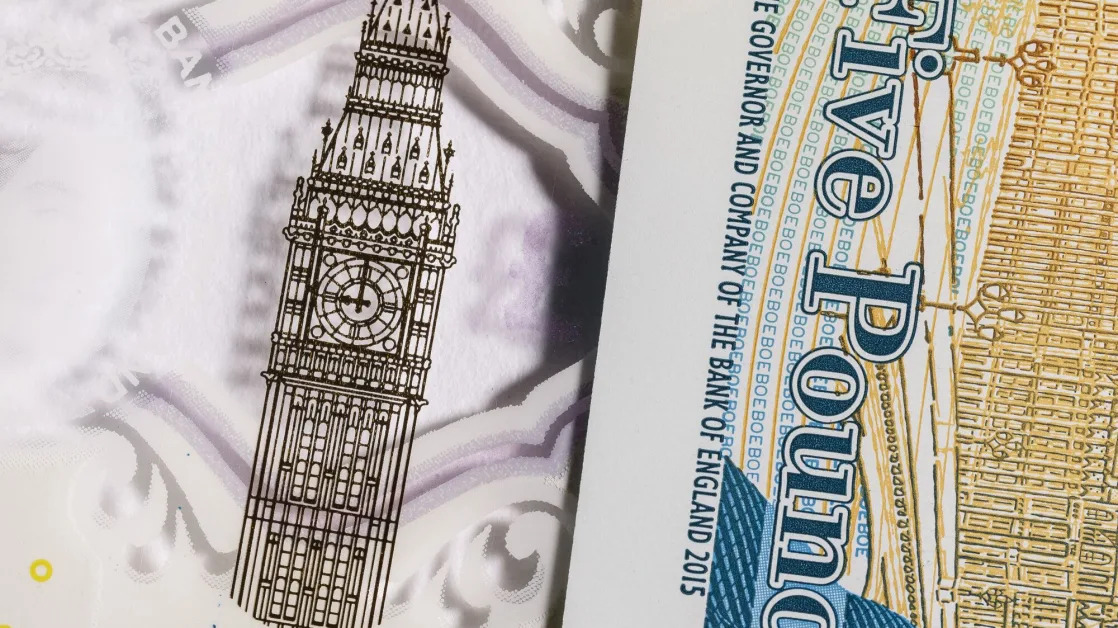(Bloomberg) -- As broad selling took hold in UK markets for a fourth day, focus turned to the pound after it fell to the lowest level in over a year.
Concern that the Labour government will struggle to keep the nation’s deficit in check amid higher borrowing costs pushed sterling down as much as 1% on Thursday to $1.2239. That’s the weakest level since November 2023.
The currency move followed a surge in gilt yields earlier this week to the highest levels in years. Investors have been irked by the government’s escalating debt burden and persistently high inflation for months, and when a global selloff gathered pace this week, UK assets quickly took the lead.
The speed of the moves has seen comparisons drawn to the fallout from Liz Truss’ ill-fated mini-budget in 2022, and the 1976 debt crisis that saw the UK ask the IMF for a bailout. It also prompted the Treasury’s chief secretary to try to reassure investors saying the gilt market is functioning in an “orderly way.”
“The worry is that investors have just lost faith in the UK as a place to put their assets,” said Eva Sun-Wai, a fund manager at M&G Investments, on Bloomberg Radio.
Sun-Wai said the pound falling while yields rise may be “a signal of capital flight” as normally higher rates make a currency more attractive. The move prompted jokes in the City, with Citigroup describing sterling as the “Great British Peso” — a reference to a more volatile emerging-market currency.
“The pound could remain the preferred pressure valve for anxious investors who worry about the outlook of their UK portfolios,” said Valentin Marinov, head of Credit Agricole’s Group-of-10 FX strategy in London.
The market rout eased on Thursday afternoon, with gilts and stocks erasing earlier losses and the pound trimming its drop to 0.5%. But activity in the options market suggests the currency turmoil may persist.
The cost of hedging the pound over one week jumped to the highest since the US presidential election. Risk reversals, a barometer of market positioning and sentiment, show traders are most bearish on the UK currency in two years.
Banks including Wells Fargo and Deutsche Bank said there’s room for sterling to drop further as investors unwind long positions and the BOE cuts interest rates. Hedge funds have been the predominant sellers of the pound over the past days, according to Barclays.
Worst Case
Investors say the selloff in British assets is a culmination of the country representing all of the worst-case scenarios for investors right now: persistent price pressures, a ballooning government debt pile and tepid economic growth.
The surge in borrowing costs threatens to wipe out the government’s dwindling £9.9 billion ($12.2 billion) of fiscal headroom. If Chancellor of the Exchequer Rachel Reeves is forced to tighten fiscal policy, she would favor fresh cuts to public spending over tax hikes, according to people familiar with her plans.
“Weakness in GBP and the gilt market feels like an inevitable consequence of a badly received budget and the proposed stage management of 2025’s fiscal events,” said Matthew Amis, an investment director at abrdn. “The UK is borrowing a lot this year, investors need confidence to buy that debt.”
Analysts have also said the underperformance of gilts suggests UK bonds are losing buyers to an avalanche of debt being sold at elevated yields elsewhere. Rates on US Treasuries, the world’s safest asset, have also reverted to multi-year highs recently.
Compounding the gilt market’s problems are changes in UK pension funds — historically major buyers of government debt — as their investment goals shift. UBS Group AG estimates demand for gilts from the industry sharply dropped last year.
“Markets are rightly nervous about depth of demand for gilts,” said Giles Gale, a strategist at UBS. “Fixed income weakness has been a global theme, but sentiment on the UK is particularly vulnerable.”
Equities also rebounded from an earlier sharp decline, but the UK’s domestically-focused FTSE 250 Index still closed near the weakest level since April. Homebuilders like Taylor Wimpey Plc and Barratt Redrow Plc were among the biggest laggards in recent sessions as swap rates that are used to price mortgages spiked.
The yield on 10-year gilts ended Thursday at 4.81%, little changed on the day but near the highest level since 2008. The rate on 30-year bonds was at 5.38%, the most elevated since 1998.
“Markets look to be assuming some kind of fresh fiscal consolidation will be needed to help restore the UK’s position,” said Chris Beauchamp, chief market analyst at ING. “Comparisons with 2022 are overblown, but are unlikely to disappear in the short-term.”
--With assistance from Masaki Kondo, Ruth Carson, Greg Ritchie, Joe Easton, Michael Msika and Alice Gledhill.
(Updates market moves throughout. An earlier version of this story corrected the scope of stocks move in second paragraph.)


